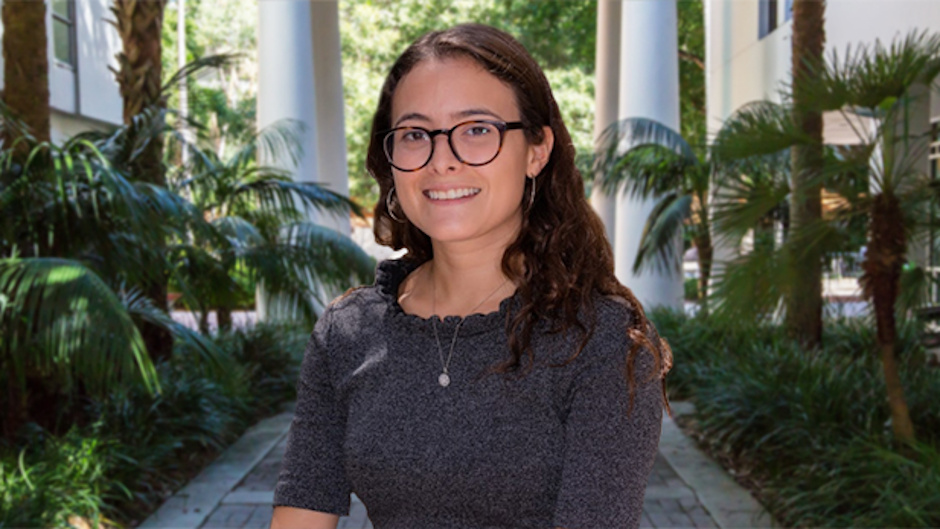If third-year J.D./LL.M. in Entertainment, Arts, and Sports Law student Catherine Perez’s road to graduation is any indication of forthcoming success, the future should brace for impact.
Just currently, the Miami Public Interest Scholar is working on provenance research with the University of Miami’s Lowe Art Museum, helping them confirm that they are in compliance with the Native American Graves Protection and Repatriation Act, updates to which the Department of Interior recently proposed.
At the same time, Perez is the administrator of the Hoffman Forum, an annual program addressing issues at the intersection of law, public policy, the arts, and social justice. She is helping to organize a panel on whether non-fungible tokens provide greater access into the primary market for artists that traditional gallery spaces have underrepresented.
“I think my status as a first-generation college graduate and being a Latina in law school has encouraged me to seek opportunities that affect under-represented and under-advocated communities,” Perez said. “I have a passion for the arts and more specifically artist rights, this has led to a fascination of the intersection of the arts with web 3.0 and blockchain technologies.”
Undergraduate Calling Led to Miami Law
While attending Washington, D.C.’s George Washington University’s Elliott School of International Affairs, where she was the recipient of three Presidential Service Awards for more than 100 hours of community service in an academic year, Perez worked as a paralegal at Clark Hill PLC drafting U.S. immigrant and non-immigrant petitions, training and mentoring new paralegals, and contributing pro bono hours for an asylum case. These experiences led Perez to apply for the Miami Scholars program and to attend law school.
The Miami Scholars program encourages students to obtain practical work through clinics and so early in her Miami Law career, Perez worked with Miami Law’s Tenants’ Rights Clinic right at the end of the eviction moratorium, helping clients obtain rental assistance to avoid future eviction. She saw first-hand the important impact legal aid services have on local communities.
During her 1L year Perez learned about the joint degree program and was admitted. “The program and its directors have been instrumental in my success and interest in art law,” she said. “Specifically, I am so lucky to have found mentorship in Dean Greg Levy and Professor Stephen Urice, both of whom provide unmatched expertise and leadership in their fields.
“The best part about the program is that while I am on the LL.M.’s Arts track, I am still able to take advantage of the program’s hands-on, practical, and interdisciplinary curriculum which has further led me to see just how broad the art law field is and can be,” she said.
Perez has also facilitated conversations and panels on campus through her involvement in Miami Law’s Global Entertainment and Sports Law Conference by organizing panels discussing intellectual property rights for graffiti artists and the social and cultural impact of ‘smart’ public infrastructure projects.
Internships and Career Development in Law School
As a rising 2L, Perez earned a highly competitive legal internship at the National Trust for Historic Preservation, where she gained non-profit experience in their General Counsel’s office where she contributed to an amicus brief to the Michigan Supreme Court and legal research on data privacy and the Confederate monuments controversy. At Miami Law, she became Urice’s research assistant.
Last summer, Perez secured a prestigious legal internship in the Office of the General Counsel at the Smithsonian Institution. There, Perez was able to explore the legal issues that affect non-profit museums. Specifically, she prepared explanatory memorandums on blockchain technology and whether the Smithsonian should accept donations of cryptocurrency.
“Throughout my time at UM I have worked closely with my career advisor, Diane Quick. When I came to her for the first time as a 1L interested in art law she helped me search for worthwhile opportunities, keep track of deadlines, and prepare for interviews. I am so grateful for her help as the Career Development Office truly played an important role in my professional success while at UM,” Perez said.
Future Waits in New York
“From my first day at UM, the Miami Scholars program has helped me build a pro bono ethic that I plan to maintain after graduation,” Perez said. “The program not only made it possible for me to attend law school, but also has presented opportunities and encouraged conversations for becoming involved with the greater Miami community. It was through their office where I first learned about LegalARTLink, a local Miami non-profit providing local artists with pro bono legal services. This organization showed me that I could combine my passions for the art world and the law to find meaningful and exciting work.”
This summer, Perez will head to New York as an incoming summer associate at Pillsbury Winthrop Shaw Pittman LLP, a global law firm focusing on technology and the media, energy, financial, and real estate industries. After graduation, she intends to gain valuable experience in New York while maintaining her pro bono ethic through involvement with the arts non-profits.
“I, along with my dreams and ambitions, have felt remarkably supported throughout my time at UM. My involvement with the Miami Scholars and EASL programs, coupled with the guidance received through the career office, has been professionally liberating as I continue to explore the art law field. I am so proud and lucky to be a ‘Cane.”
Read more about studying Entertainment, Arts, and Sports Law
More on joint degrees at Miami Law

